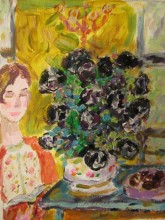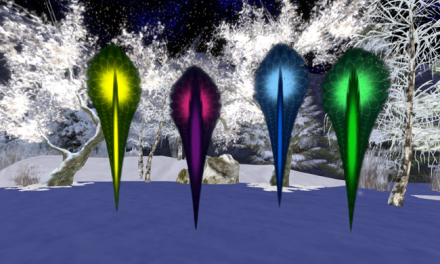Shari L. Klase
When she got the phone call, she was almost expecting it. Not the who, of course, but the why. It was because her normally green philodendron had turned the color of ebony.
“Elsa, Mom is gone.”
Tears trickled from Elsa’s eyes. She had been living in this dread for such a long time. It was a burden to know when death knocked, but not knowing for who. It might just be a close neighbor or a family pet. Or it could be a loved one; like today. She had gotten to the point that she didn’t want to even glance at the house plants anymore. But the darkness stood out. She had no choice but to see when the light exposed the thing that brought death once again to her door.
The plants weren’t dead. They were alive and thriving. In fact, they were more virile than they ever were in their natural states. They were just black like the velvety skin of a seal. Black as her cat, Jasper. Jasper didn’t turn black. He came that way. She refused to have a cat of any other color for fear one day he would change to black just like the plants, announcing demise. He was a natural black cat and Elsa felt safe with him.
Safe as she felt with Jasper, everything else made her feel uncertain. She couldn’t let it happen again.
She picked up the philodendron and carried it to the door. She opened the door and tossed the plant out. Then she did the same with every plant she had in the house. The plants weren’t responsible for the deaths, she knew that, and yet it was as if they were; these harbingers of desolation. She threw out the black lily that foretold her grandma’s death. She ejected the black Wandering Jew that had foreshadowed her best friend, Trina’s death. She slammed the pot to the ground that contained the black geraniums that she woke to the day her father died. She wouldn’t let these plants continue to remind her of her loved one’s deaths.
How ironic that they lived while her friends and family died. Would the whole world continue to die and her life be filled with blackness. Well, she would see that it didn’t happen. She broke every pot into fractured pieces and stomped the black plants into the ground, but she couldn’t kill them. The next day their roots groped into the soil and the plants stood straight and tall. They had lives of their own, and Elsa was not capable of stopping that.
Still, she would never allow another plant into her home. If the black plants would continue to live and thrive reminding her of death, she would never allow another plant or creature in her home other than Jasper. Perhaps she could hold off death by denying death a vehicle to sink its roots into.
She sighed as she viewed her home. No more plants. She was safe. She felt like singing. No one else need die. She picked up her purse and headed out the door. She ignored the blackness outside. It didn’t need to touch her. It had nothing to do with her.
She attended her mother’s funeral with her sister next to her. Though Elsa felt sadness, she could hold tight to Melissa’s hand. Melissa was safe. She had saved her. No one else would die. Then she looked at the flowers surrounding her mother’s casket and frowned. What if the flowers turned black? Someone else would die. She rose and ran toward the coffin. Everyone gasped. Was Elsa going to scream and prostrate herself on her mother’s chest or rip her body from its tomb? No, instead she picked up all the flowers and tore them to shreds. She kicked at them and swept them away. She turned and faced the terrified onlookers.
“No flowers,” she said adamantly.
Melissa sprang to her side and led Elsa away. “Elsa, you’re hysterical. It’s okay. Mom’s gone, but I’m here. Everything will be fine.”
But Melissa couldn’t know that Elsa had just saved her life; or if not hers, the lives of one of these others. None of them would ever know. People excused Elsa’s behavior. She had, after all, experienced a great loss. What could be more understandable than breaking down at the funeral? Many people did it. It showed the depths of her feelings for her mother.
After the funeral, Elsa began to distrust. No plants outside her house ever turned black before. Yet, she wasn’t certain it wouldn’t happen. With her uncertainty came fear. Fear could create darkness. Elsa shut herself in her house. She drew the curtains. Not even the sun was welcome inside. Those who loved her could come to visit. She would not venture into a world of blackness.
Melissa was concerned for her. Yet, she attributed it all to grief.
“Maybe you should see somebody,” Melissa said tenderly. Elsa shook her head. “Mom wouldn’t want this for you.”
“Mom would want me to stay safe,” Elsa contradicted her.
“There is no safe place. Life is a risk.”
Melissa grabbed a big risk when she allowed a jerk named Jerry into her life. He ditched her for a dancer named Katarina, but not before he left her with a souvenir. Cassie was brown-skinned, dark eyed and jolly. She laughed far more than she cried. She never questioned why she didn’t have a daddy. She was happy with her Mommy and her Aunt Elsa.
Though Elsa still wouldn’t set foot outside her door, her life was as bright as sunflowers when Cassie was in it. If she’d be tempted to live life again, it would be because of Cassie, but it was also because of Cassie that she didn’t branch out. She had another precious life to protect. She knew she could keep Cassie safe by staying tight within her shell.
Sadly, it was not to be, though it seemed so promising. The darkened fauna failed to reappear to haunt Elsa for years. She was humming to herself. Cassie and Melissa were coming for lunch. It was a bright spring day; sunny and delightful. The kind of day where you want to run in a field of white daisies and fall down flat on the grass and soak up the sun, but Elsa hadn’t done that in ages. Still, she was happy thinking about her visitors. When the knock came at the door, she hurried to welcome them.
With dismay, she opened the door to see Cassie holding out bright yellow dandelions. She would have knocked them from her hand, but Elsa could only freeze as the moment Cassie skipped through the door, the dandelions turned black as coal. And Elsa knew. It was an omen. It wouldn’t be a neighbor, or a distant cousin. It would be Cassie.
Cassie startled at the transformed flowers.
“They’re just like your flowers outside,” Cassie chirped in wonder.
Melissa stood in silence like her sister. “What does it mean?”
“Nothing! It means nothing!” and Elsa tossed the flowers outside to grow alongside the other black ones. That day she broke her golden rule and left the house with Cassie and Melissa. She paid no attention to flowers or plants. She was determined to share a day in the sun with her loved ones. What did it matter anyway?
But it didn’t stop death. Two days later, Cassie was struck by a car and died in the arms of her mother and Aunt Elsa. After the funeral, Elsa did what she should have done years ago. She locked up the house and never set foot in it again. She moved to a little cottage by the sea where flowers and plants didn’t much grow; only dead seaweed dotted the landscape of bare sand and surf.
She still wasn’t tempting fate, however and never allowed a flower or plant to grace her little home. Melissa didn’t really visit much. Elsa blamed herself and couldn’t stand for her to be around; reminding her of little Cassie. Melissa felt the chill in the air.
However, Elsa’s life changed. She no longer stayed in her cottage by the sea. She ventured out to stroll the beach, to watch people or to visit. What did she visit? Not people. Museums; especially art museums. Although Elsa was no longer in seclusion, she was still sequestered. She refused to become involved in people’s lives. Without caring, she could not hurt them.
As Elsa lost herself in the blue of Edward Hopper’s Summertime, she sighed. But she started as a hand touched her shoulder.
“It’s your favorite piece here, isn’t it?” the young man asked.
“How did you know?”
“I’ve seen you here before. You spend a lot of time looking at it.”
Elsa looked up into the cool, blue eyes. She thought of moving away, but she was tired.
“You know what she’s thinking because you think the same way,” he said.
“What do you mean?”
“She’s all alone in a sea of blue and so are you.”
A tear fell from Elsa’s eye. She let it fall. “I choose to be alone.”
“Do you? I don’t think you do. Your fear keeps you isolated, but you don’t need to be afraid.”
Elsa felt a barrier rise between them. “What do you know?”
“I know I’m not afraid of you even if you want me to be.”
Elsa drew in her breath. “Maybe you should. I hurt those I love.”
“Every rose has thorns. It wouldn’t be a rose without them.”
He took her arm. “Let me take you somewhere.”
“Where?”
“Anywhere. You are a spectator. It’s time for you to be a participant.”
“I don’t even know your name.”
“It’s Kent, but does it matter what my name is?”
“Only if it’s the final word somebody says to you.”
“You’re a mystery, and that’s what I like about you. Let’s tempt fate together.”
Elsa looked long at him. “You don’t know what that may mean.”
“I don’t care, because I make my own destiny.”
He took her hand and she followed. Ever after, she wasn’t afraid. The fear wisped from her like the emergence of a butterfly from a chrysalis. Before that, every day she had awakened from her sleep but now she was awake. She explored fields of flowers and she never once examined them for color. None of them were black, anyway. Life was blue, red, green and pink, but never black. She enjoyed candlelight dinners and for once, she didn’t remove the vase of flowers.
One day she awoke and looked outside her cottage, there was nothing dark outside; not one shade of gray. She opened her door and there on the threshold was a bouquet of blue roses. She scooped them up and paused outside her door. The card read: To my mystery girl, Elsa, who is no longer alone in a sea of blue.
She hesitated before turning around and entering her cottage. This was the moment; the turning point. She would either face her fears or live in perpetual doom. She stepped across the entrance. For a moment she thought the edges of the roses were tinged in black, but she took a deep breath and wished the evil thoughts away. They were vibrant blue again. She kissed them and put them in a vase. She would never fear black roses again.
And as she turned and faced her new life, a furry figure rubbed against her leg. She looked at Jasper and gasped. The black cat was no longer the color of ebony. Jasper was as light as the day, and so was Elsa’s heart. Elsa smiled. Perhaps it was time to call her sister.
Shari L. Klase lives in the beautiful Susquehanna valley with her artist husband and incorrigible corgi, Lucy. She blogs at sklase.wordpress.com and has published over 50 short stories online and in print. http://www.amazon.com/Shari-Klase/e/B00BO8522I



